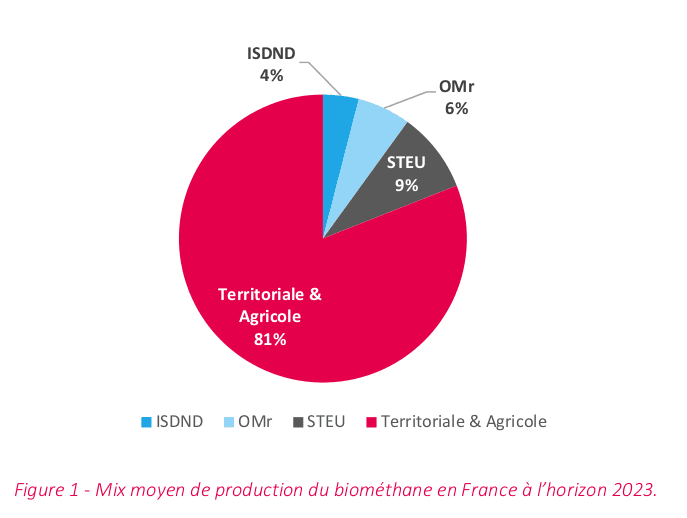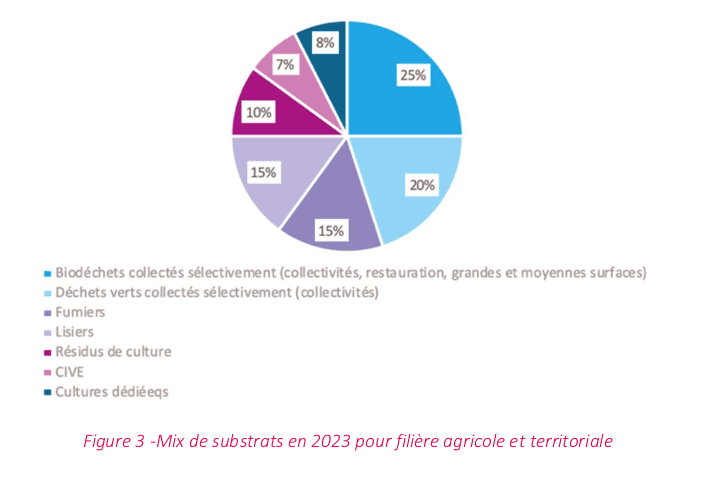Calculate your climate footprint in 10 minutes top time.
Start the testHere is an explanatory note on the integration of the figure from the Empreinte database into NGC, and its limitations.
We need to clarify what in NGC prevents us from using the lowest factor in this consumption calculation model, which is a global calculation that also covers agriculture via food.
Another crucial point is that gas can be stored, unlike 'green' electricity, which is why their emission factor has not yet been included in NGC.
In addition, leaks from biomethane installations, which are by their very nature much smaller and more numerous than fossil gas and therefore difficult to control, could be underestimated. Is this study (202200267-6) taken into account in the above emissions factor (2020)?
The link in the Base Empreinte documentation to the GRDF study is no longer online. Here it is in PDF. It shows :

The red part is detailed here:

It shows that the proportion of dedicated crops is very low, which is very reassuring.
Having said that, and I'm not sure how to define it precisely, I do have the strong impression that a large proportion of these components could be recycled differently: in practical terms, we're burning and therefore recovering at a very high price (wholesale gas prices in September 2022 will cost almost twice the biogas production price (€90/MWh)) the chicken scraps from the canteen that we could just not have produced (blue); the domestic lawn that the neighbour mows every week (light blue); the manure from crops that could have been dedicated to human plants (purple); and so on.
In short, while some of the energy present in the materials used by biomethane was simply lost, another part simply undergoes a change of allocation, from something useful to the agricultural world to the combustion of gas to heat homes in particular. Not to mention the windfall effect for activities that emit, which can be substituted by others that emit less. The study seems to be very comprehensive, though, so it's worth looking into. Perhaps it answers all the questions that I haven't seen (it's complex).
There's also an article in Reporterre that worries about bacterial contamination due to the spreading of digestate and the leakage of methane and nitrous oxide N2O, which are underestimated (because they are present and therefore assessed in the study cited by the Base Empreinte). Please note, however, that Reporterre is not a research organisation, but an opinion medium.
A very recent investigation into methanisation plants in Brittany is along the same lines, cataloguing the incidents that have taken place in the region: https://basta.media/des-methaniseurs-menacent-l-environnement-la-carte-inedite-des-accidents-en-Bretagne-Splann.
In my opinion, this does not call into question the inclusion of this factor in UCS. Fossil gas production is also affected by problems of this kind, by way of example.
Another question that may be answered here is this: can the sector increase production by a factor of 10 without introducing negative externalities that are currently under control? It would be interesting to answer this question for UCS users, to show them that their choices can be passed on to society as a whole. Carbone4 seems to be responding in the negative: replacing fossil gas with biomethane should not lead to a failure to reduce gas consumption in general, and even less to a rebound effect!

A warning is therefore included in the simulation to highlight the impossibility of scaling up:
Biomethane reduces enormously the CO₂ emissions of the gas you consume, but current production is unable to scale up: the overall reduction of all gas consumption remains essential, whether you consume biogas or fossil gas.
To find out more about this rule in our model, run the calculation by clicking on the button below.